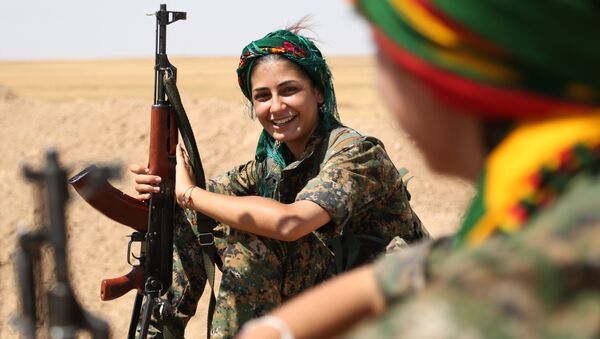The pro-Sharia street posters in the Syrian city of Afrin, which was occupied by the Turkish military and Syrian anti-government militia in March 2018, have triggered an uproar among the local Kurdish majority, according the British newspaper Independent.
Mostly Muslim, but committed to a secular way of life, Kurdish women have reportedly held protests in the city, demanding that the ads be taken down, urging them to wear traditional clothes, covering the face and body, and follow extremely strict Sharia rules.
READ MORE: Turkish Operation Olive Branch in Syria's Afrin: Facts and Figures
While the posters have been removed by the Turkish police, a local activist, cited by the British newspaper, calls the posters a part of a campaign impacting the independence of Kurdish women.
“Just because I wear jeans, I always hear words such as ‘whore, disbeliever, dogs of Assad and the Shiites from strangers in the street,” she says.
Welcome to the #Turkish controlled #Afrin:
— Nervana Mahmoud (@Nervana_1) 7 июня 2018 г.
Two street adverts:
•Hijab is a red line
•Hijab is not just head cover, but conservative garments that do not reveal what underneath. pic.twitter.com/YYacvLtn7a
According to the Independent’s report, Kurdish women are under pressure from the militia belonging to fundamentalist Islamic groups that have seized control over Afrin, as well as from newcomers who had been ousted from eastern Ghouta during the operation of the governmental forces against the terror groups.
While about 137,000 people have left the area of Afrin since the Turkish Operation Olive Branch began, 143,000 people remain in the war-torn area, according to the United Nations.
According to the Human Rights Watch, which interviewed people displaced from the area, the fighters who seized control over the city move their supporters from other parts of Syria and let them take over and damage their homes, businesses and property without compensation. The rights organization points out that such actions can be identified as war crimes.
Soon after the city was taken, the Turkish authorities reported that they were investigating looting allegations in Afrin and promised to ensure that it would be a safe place.
Later in April, one of the militia groups in the area, Ahrar al-Sharqiyah, also stated that they carried no responsibility for property seizures and looting.
The current situation in the Kurdish-dominated Syrian city of Afrin remains quite tense since it was overtaken by Turkey after a three-month operation, aimed at “clearing” its border with Syria of the Kurdish People's Protection Units (YPG) and the Democratic Union Party (PYD). Ankara believes them to be linked to the Kurdistan Workers' Party (PKK), listed as a terrorist organization by Turkey.
Turkish President Recep Tayyip Erdogan stated that the advance would not end with the capture of Afrin, clarifying that the regions of Manbij and Idlib would be the next targets. Damascus slammed the operation as a violation of Syrian sovereignty.




